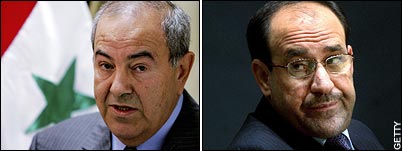
With close to 90% of the votes tallied in Iraq's parliamentary elections, the coalition headed by Iraqi Prime Minister Nouri al-Maliki has taken a slim lead over the bloc led by his main challenger, Iyad Allawi. A day ago, it was the latter.
Since March 7, Iraqis have been glued to their television screens looking for clues for the direction their seven-year-war ravaged country might be heading in the next few years. Similarly, residents in neighboring countries have been closely monitoring the Iraqi elections through the many satellite television networks operating in the region. After all, elections are not a daily happening in the Arab world, and a number of those countries, such as Jordan and Syria, permitted Iraqi refugees to cast votes in their territories.
 Meanwhile, one does not have to spend a lot of time watching Iran's Arabic-speaking Al Alam TV or the Saudi-financed Al Arabia TV in order to figure out who are the regional stake holders in the Iraqi elections. At times the Iraqi elections seem to take the shape of a battle between Iran and Saudi Arabia, as both countries have been overtly and covertly supporting the two heavyweight contenders. Iran supports Prime Minister Nouri al-Maliki, while Saudi Arabia has been rooting for former Prime Minister Iyad Allawi.
Meanwhile, one does not have to spend a lot of time watching Iran's Arabic-speaking Al Alam TV or the Saudi-financed Al Arabia TV in order to figure out who are the regional stake holders in the Iraqi elections. At times the Iraqi elections seem to take the shape of a battle between Iran and Saudi Arabia, as both countries have been overtly and covertly supporting the two heavyweight contenders. Iran supports Prime Minister Nouri al-Maliki, while Saudi Arabia has been rooting for former Prime Minister Iyad Allawi.
Both al-Maliki and Allawi are Shiites, so why does Saudi Arabia want Allawi to win?
Al-Maliki's "cozying up" to Iran has been alarming many Arab countries. The Iraqi Prime Minister, whose Dawa Party is backed by Iran, has been flashing the sectarian card during his election campaign. With more than 500 candidates accused of links with the Ba'ath Party banned from running in the March elections, Al-Maliki's government has been accused of using the hated former regime to intimidate Sunnis in particular and opposition in general.
Iyad Allawi, although a Shiite, leads the al-Iraqiyya list, which proposes a secular agenda for the country. Many of its leading members are Sunnis or Arab nationalists who share the goal of bringing Iraq back to its Arab roots. Allawi's campaign ads have been airing on several Arab television stations, some say courtesy of Saudi Arabia.
But does this really matter to the average Iraqi citizen?
Not according to Kazem al-Dari, an Iraqi social scientist.
"What we need is stability," he says. "We've had elections before, we've tried Allawi before and now al-Maliki. Neither one brought stability and security to Iraq."
Today marks the seventh anniversary of the start of the Iraq War. In 2003, the architects of the war envisioned that the toppling of Saddam Hussein would lead to the birth of a democratic Iraq. They told us that elections in Iraq would help spread democracy and liberalism across the Middle East, but this could not have been further from the truth.
The Middle East is more chaotic than ever, and the vast majority of its citizens are leaning politically towards Islamic theocracy and not liberal democracy. Iraqis are still searching for stability.
